Click to view our Accessibility Statement or contact us with accessibility-related questions















Keyboards at work: A rationale for returning mechanical keyboards to the office environment.

search
close
Sort by: Newest
keyboard_arrow_down
Aristarco
200
Mar 27, 2024
I work at a State Government office and as such, budget is everything. They started cutting on everything, from toilet paper to ball-point pens. Making them change their minds to include mech keebs in the budget is unthinkable but when I did bring the first mk I had bought, a Keychron K2, my workmates started asking where to get one and if they could try it. Most of them are not buying one because of the price and so I started making keebs to see if I can make an affordable one with all the features they like while making them smaller in layout.
I'm still trying, showing prototypes and asking for feedback. Maybe they'll never buy one but I'll keep trying. One thing I love as much as using a mechanical keyboard is designing one. From KiCAD layouts to soldering components to finding keycaps and burning firmware, it feels like the handcraft of a middle-ages artisan.
I'd love to see enough acceptance so as to order customized keycaps with the organization image. But I'm also realist and I know that may never happen. But one can always try. And have fun in the process.
Fun fact: When I got Kailh Box Jades, some of the loudest clickies I've ever heard, my goal was to annoy everyone. Instead, a flock of analysts came to my desk asking where to get a keyb that sounded like that because they loved it. Go figure!

storyboardtech
387
Keyboard Club Member
Mar 27, 2024
AristarcoBox Jades for the win! I love those, and they have such a typewriter/office sound. I'm telling you, people miss that vibe.
Clique
15
Mar 27, 2024
Thank you for this insightful and interesting article. I have been into custom keyboards before there was such a thing. As I writer, I loved the well-built peripherals before rubber domes cheaped out the boards.
With zero regard for anyone else, I have brought in to the office the clickiest builds I could find. In my quest, I discovered a keyboard company out of Canada that produced keyboards with White Alps switches. Expensive and fantastic. The problem is that the hard-wired switches would go bad after a year or two.
For awhile, my daily driver at the office was a Razer. I got custom keycaps for it (SA profile, I think). It only did green LEDs, and I wanted RGB, so I sold it to a guy who sat next to me and I got a Black Widow x Chroma. Tricked it out with purple Pudding keycaps. Suddenly it wasn't good enough for me so I got a CoolerMaster. Now I have a Womier K87 and a K21 (numpad!) with ceramic keycaps and AKKO V3 Crystal switches. However, because of my Razer, three other people went out and bought them, and I selected a CoolerMaster for one of the owners of the company. I like where this is going...

TaylorD
384
Mar 27, 2024
I'm currently using a Keychron V5 at work with Durock Silent Linears, and assembled my wife a V6 w/ Durock Silent Tactiles for work. Both feel quite nice and sound quiet enough to use in the office. At home, I use a Razer Blackwidow V4 75%, that I really thought I'd change the switches, but it's actually quite well-built and pleasant sounding to type on. Razer did a good with that one. I've always wanted hot-swap with Chroma 😅
I really think you're onto something here though. I work in IT and I detest using the flat rubber dome keyboards they have, to the point that I have to edit myself down because it's too pleasant to type on my mechs. Also, arguably we need a keyboard that's certified for secure use. It doesn't always matter, but some agencies refuse anything that's not OE from a major manufacturer...
(Edited)

Chibigodzilla
3
Mar 26, 2024
When I went back into the office after working from home during COVID, it took me about 15 minutes before I was like "This shitty, free with purchase, membrane nonsense is not going to cut it anymore."

MonetsChemist
72
Mar 26, 2024
Your article is bang on. Thanks for writing it! Personally, I'm a happy Tokyo60 user and I have a number + arrow keypad on the side for days when I'm bashing more than a few numbers. I really like this layout because my mouse is right next to the Tokyo60 and the separate number keypad is on the other side of the mouse, which really works for my needs. The nice mechanical keys, board, frame, caps make a huge positive impact on my daily work life. When I have to use some mediocre to sh*tty membrane keyboard or the Thing that is on my otherwise quite fine System76 laptop, I groan.

SuperKrog
18
Mar 25, 2024
worked for a while with a simple dz65rgb with cheap plastic case, SA ABS keycaps and sakurios switches... it was really pleasant. Now I work from home with same keyboard and a metal case added :-)

FOENME
6
Mar 22, 2024
I work for an airline in the cargo department, I am happy to report that more individuals are curating their workstations. (DHL) would be my first pick for early adopters of custom designed switches. DHL is all about the brand coloring system. If it is a shared workspace silent keys are perfect, I picked up the (Silent shrimps) not too long ago and they are impressive! However. Also (clicky) switches should be allowed, anyone one who has been held hostage through mandatory overtime has earned the right to bang their cup against the bars of their confinement. I am also an advocate for earbuds/headset in the workplace. I had a supervisor complain what if it is an emergency, you can’t hear me (My reply - I’m not blind and I can smell fire…) we have Microsoft teams and if you need to speak to me that urgently you can either walk 10ft or call my phone. If you on the other hand are worried about your personal safety, why not sit where we can see you hiding behind a cubicle doesn’t make you invisible, I know you’re slacking off because I can’t hear you typing…#OfficeSpace "What would you say it is you say you do here?"
(Edited)

storyboardtech
387
Keyboard Club Member
Mar 22, 2024
FOENME"anyone one who has been held hostage through mandatory overtime has earned the right to bang their cup against the bars of their confinement." amazing line. Thank you for your thoughts! I agree that brand specific keycaps or switches would be SO fun.
PRODUCTS YOU MAY LIKE
Trending Posts in Mechanical Keyboards

DaveKaretnyk
Mode Tempo with Red Samurai
Mode Tempo (60%) with GMK Red Samurai & Mode Lotus keycaps
Apr 25, 2024

dvorcol
Support for Alternative Layouts
This is a summary of how alternative layouts have been supported by kits such as Colevrak and Homing. It is not a discussion of alt layout performance and development, but if that interests you I highly recommend starting with Pascal Getreuer’s A guide to alt keyboard layouts (why, how, which one?). It’s a concise and comprehensive overview with links to some great sites that go deeper. He also has a separate Links about keyboards page. The Keyboard layouts doc he recommends explains layout goals and metrics in detail, summarizing the alt layouts discussed here as well as more than one hundred others. Sculpted-profile The majority of custom keycap sets are sculpted-profile (Cherry, SA, MT3, KAT, etc. - more on profiles generally here) so let’s start there. Because each row has a unique keycap shape, alt layouts require a unique keycap for each legend that moves off its QWERTY row. At first there were two The Dvorak layout was patented in 1936 by August Dvorak & William L....
Apr 23, 2024

CousinTimmy
Promo codes for stack Macropad v2
is there any promo codes right now that work with the STACK OVERFLOW THE KEY V2 MACROPAD? link:https://drop.com/buy/stack-overflow-the-key-v2-macropad?searchId=ead314359856d5486d35f4713cff32e9
Apr 23, 2024

Robbedoes
*Help* Screw in stabilizers not fitting in Dropshift V2 keyboard
I'm trying to build a mechanical keyboard with screw in stabilizers, I've build some mechanical keyboards with click-in stabilizers, never with screw in. Somehow one of the pins of the metal top-part collides with the screw in stabilizer of the numpad "enter key". I already tried grinding of a bit of the pin that collides with the stabilizer, but unfortunately I can't make it fit/close properly. You can see that the pin of the toppart leaves a mark on the bottompart of the stabilizer, see picture 2. What am I missing? Using Durock V2 in a Dropshift fullsize V2. See pictures below, thanks in advance!
Apr 23, 2024
Fukyachickennuggets
Polymer clay
Don't drop crazy cash on custom wood builds! Instead go buy polymer clay and paint. Then you can spend a ridiculous amount of time trying to make it look like you can afford to drop crazy cash on...
Apr 22, 2024
GrEEdYY
HELP PLEASE!
HELP PLEASE! I put noise insulation in the keyboard and after that it stopped working, the only sign of life is 5 blinks of orange light.can do something about it? model:DROP ALTv1
Apr 22, 2024
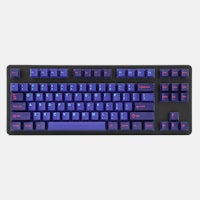
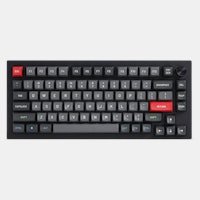
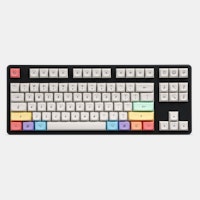
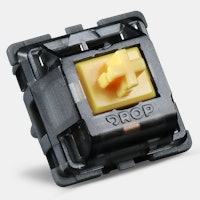
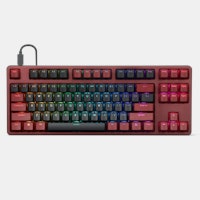
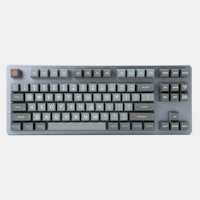
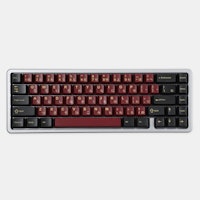
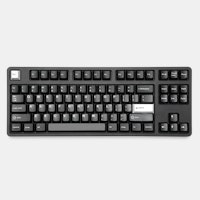
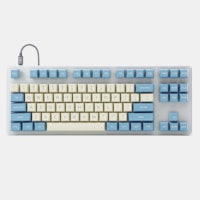
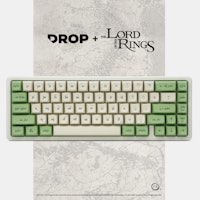
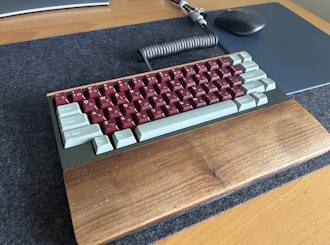
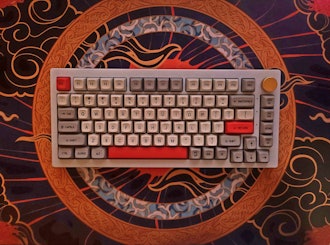
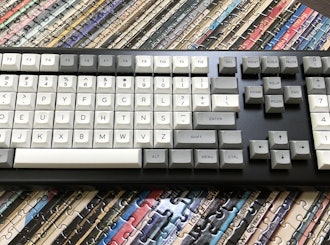
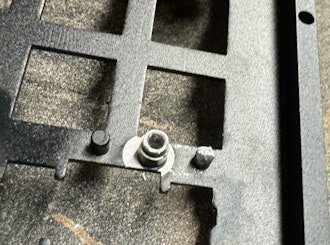
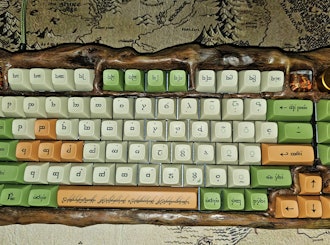
Quality verses not-quality Even the well-thought-out chicklet-style keys on my high end macbook pro annoy me. They’re not painful, but they’re not great. I would rather type on my cheapest custom keyboard, with my least favorite switches, and most basic keycaps, than on my fancy laptop. And the reason is, it’s better. It’s just better. The punchy, clean response of mechanical keyboards frees my mind of the grating, persistently obnoxious chintzy-ness of standard keyboards and lets me focus on my thoughts. I think and my fingers fly. I’m not a fast typist, but you should hear me when my brain gets going. The response of the keys calls back to me, encouraging me to push on and keep going. It’s a pleasure to type on a keyboard that is built for excellence rather than frugality, just like driving a performance sports car is different than driving a base model economy coupe. Tools built for performance produce performance. So how do we swing the pendulum back? How do we bring what we’ve experienced to those we know? I’ve been discussing this subject with coworkers, c-level officers, accounting professionals and leaders in different industries for a while now, and one thing has become apparent. If mechanical keyboards are to make a resurgence in the office environment, it’s going to require a perfect storm of circumstances, beginning with how mechanical keyboards are marketed/perceived.
The threat: Why we need new entry points to the hobby. If you are reading this article, you are using mechanical keyboards professionally, and you know that you are in the vast minority. That brings a certain level of exclusivity to the hobby. No matter how affordably a good keyboard can be made and sold for, this isn’t a cheap hobby and getting into keyboards requires a base price. Nobody gets in for free. That means that the hobby must be sought out, and that places us at risk. If the ASMR keyboard videos on TikTok cease to attract viewers/new customers, the algorithms will move on and if that happens, we’re looking at a hobby that will start shrinking. We can’t expect new keyboards, keycaps and switches to be designed, constructed and sold if there isn’t a market to absorb them. And that means that we need an entry point other than novelty, for new members of the community to find us. To me, the obvious choice is business. Business priorities align with keyboard enthusiasts’ priorities in several key ways.
Gamers aren’t the answer Some argue that gaming is untapped territory for the enthusiast keyboard market, in that gamers are already using mechanical keyboards, albeit ones that focus exclusively on speed-related performance and longevity/sturdiness. I don’t think personally that the gamer keyboard market has much if anything to offer us in terms of growth, in that it’s already saturated with mech keeb owners, and their users are much more likely to buy another gaming keeb for their home office setup than to seek out an enthusiast build. They aren’t coming from a place of deficit like the standard office worker is, their keyboards do the job well, and there’s almost no reason to abandon their setup for a custom build. A small note: I do not believe that computer manufacturers like IBM or Apple will ever return to the world of mechanical keyboards as it would require admitting that their current offerings are awful. (That said, I would love to see an Apple designed mechanical keyboard. Just because.) Business users on the other hand, are coming from a place of complete deficit. The keyboards they’re provided with barely get the job done, and are often in a state of disrepair. It’s not a hard argument to make that the tools they’re using are poor, the hard part is convincing them to spend 10 times as much on the same tool.
Size matters In my mind, one mechanical keyboard company openly cares about business users. Fujitsu’s Happy Hacking Keyboard, or HHKB. PFU, who exclusively sells HHKB in the US, has a website that is a love-letter to business culture and they’ve created what they believe is the ultimate work keyboard. I personally love HHKBs, but their commitment to their small 60% footprint, while brilliant, is probably a bridge too far for most business owners. Most folks I’ve spoken to over the last few years about keyboards in the workplace come back to the num-pad. It takes a real long time for some folks to finally let go of it, and when they do, they often move into the next largest option, hence the popularity of TKLs and even recently, 80% keyboards like the one I’m typing this article on (KBD Fans Tiger 80 lite, with GMK Redacted and TTC Moon White silent tactiles that feel like topres, I swear). I feel obliged to mention that Fujitsu also offers a topre full size keyboard called RealForce, which has business and gaming applications, and is very nice. Not all heroes wear capes If a broader solution is to be offered to the business community, it’s going to require a combination of things done well, starting with size. A variety of different sized keyboards will need to be offered that businesses can choose from. It also stands to reason that the end user isn’t going to be assembling these by hand. I think that the best positioned companies to accomplish something like this are retailers like Keychron and DROP. Keychron has price-tiered offerings of different sized keyboards, all coming pre-built standard. They even come in a reasonable range of colors for customization. (Not sure if they’re reading this, and it’s certainly not the most efficient way of recommending things to them), but if Keychron were to build an alternate website dedicated to business, they could really open the doors to mechanical keyboards in the workplace. On DROP.com, the CSTM80 is perhaps the most intriguing business keyboard option, with a nicely sized 80% layout and customizable body shells that can match a company’s branding. Also, the SHIFT V2 is an approachable 100% layout, providing a num-pad to those who can’t do without. Let’s make some noise! Or not… If price wasn’t a factor, mechanical keyboards would still face some opposition to making a return to the office, and I think it would primarily come from the discussion around sound. Mechanical keyboards are auditory devices. They make sound. Do we find that sound pleasing? Yes. Does everyone else? No. So if we’re making a case for adding devices to shared environments it’s responsible thinking to consider the effect that switches would have on the office mechanical keyboard. Which leads me to this point. We could be on the edge of a potentially huge market for silent switches. We’ve all settled in to Linear/tactile/clicky as our standard option list, but if we’re to seriously engage the business world, we need to look to the growing list of impressive silent switches.